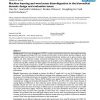Free Online Productivity Tools
i2Speak
i2Symbol
i2OCR
iTex2Img
iWeb2Print
iWeb2Shot
i2Type
iPdf2Split
iPdf2Merge
i2Bopomofo
i2Arabic
i2Style
i2Image
i2PDF
iLatex2Rtf
Sci2ools
BMCBI
2006
2006
Machine learning and word sense disambiguation in the biomedical domain: design and evaluation issues
Background: Word sense disambiguation (WSD) is critical in the biomedical domain for improving the precision of natural language processing (NLP), text mining, and information retrieval systems because ambiguous words negatively impact accurate access to literature containing biomolecular entities, such as genes, proteins, cells, diseases, and other important entities. Automated techniques have been developed that address the WSD problem for a number of text processing situations, but the problem is still a challenging one. Supervised WSD machine learning (ML) methods have been applied in the biomedical domain and have shown promising results, but the results typically incorporate a number of confounding factors, and it is problematic to truly understand the effectiveness and generalizability of the methods because these factors interact with each other and affect the final results. Thus, there is a need to explicitly address the factors and to systematically quantify their effects on...
Related Content
| Added | 10 Dec 2010 |
| Updated | 10 Dec 2010 |
| Type | Journal |
| Year | 2006 |
| Where | BMCBI |
| Authors | Hua Xu, Marianthi Markatou, Rositsa Dimova, Hongfang Liu, Carol Friedman |
Comments (0)

